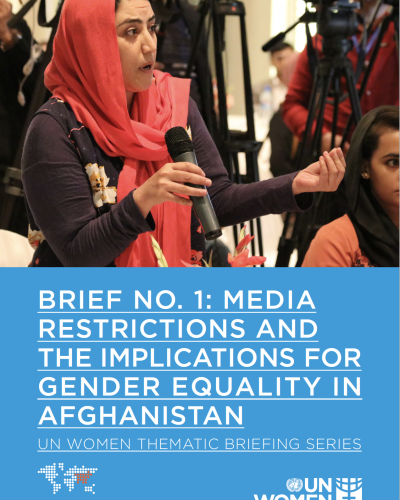BRIEF NO. 1: MEDIA RESTRICTIONS AND THE IMPLICATIONS FOR GENDER EQUALITY IN AFGHANISTAN

SUMMARY
After nearly 20 years of international investment and successful efforts to build a diverse media landscape and strengthen journalism standards, the Afghan media sector has fundamentally changed for the worse since the Taliban (also referred herein to as the de facto authorities) takeover on 15 August 2021.
Before mid-August 2021, dedicated initiatives and investment focused on increasing the number of women working in the media across a diversity of roles, training and equipping them with valuable skills and expertise, as well as a substantive focus on women’s rights and gender equality in the media content, including on how gender inequality is a driver of conflict.
The Taliban has sought to bring the Afghan media under its control, prohibiting broadcasts and publications that criticize Taliban rule and/or are incompatible with the group’s interpretation of Islamic and Afghan values.
There is no universal experience across the changed media environment, as the level of subnational variation is notable. The position of individual de facto leaders on media freedom varies according to their personal viewpoints and relationship to the media in the past, and their perception of the value of media to extend the credibility and authority of the Taliban in the eyes of the target audience.
Despite subnational variations, nationwide trends are becoming increasingly discernible, clear and solidified. Although in some cases the level of discretion may be higher, rules and practices are consistent and congruent – continuous harassment, attacks, and detention of journalists, the requirement for women journalists to cover their face when on air, and various tactics which combined lead to self-censorship and exclusion of women from the media. This indicates a systematic and coherent effort to muzzle the media and exclude women – their faces, perspectives, and experiences – from public spaces.
Afghans across the country have grown to rely on television, radio, and other forms of media for information on a wide range of concerns. For some Afghans, including those now outside the country, social media – especially Facebook – has become an alternative media platform. However, without reliable, diverse, and independent media, all Afghans are denied access to information and plurality of opinions and ideas.






